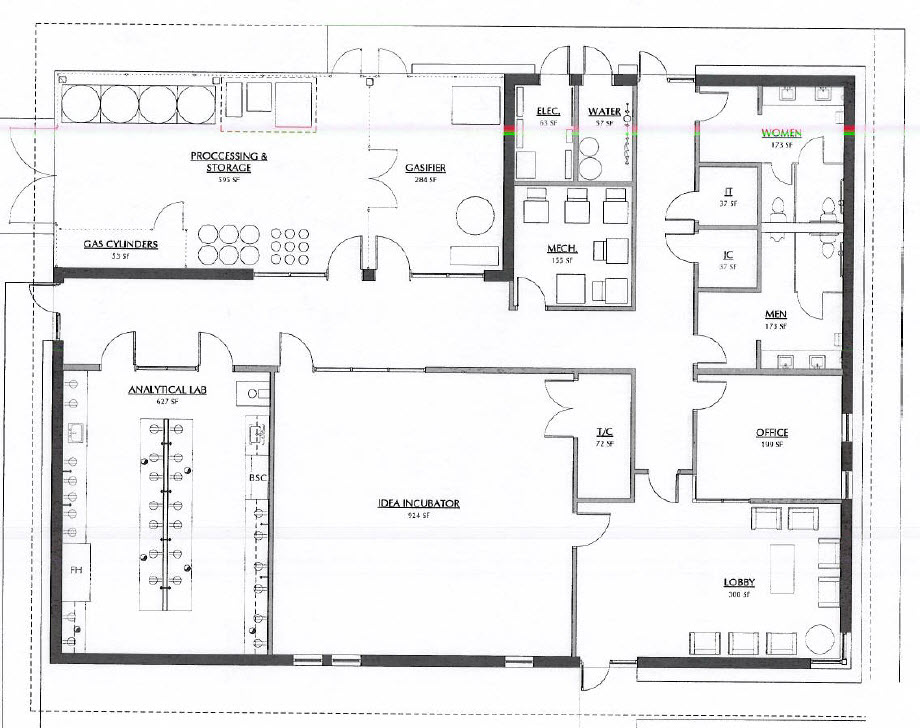CENCERE Lab Space offers Hands-On Experience
The EIU CENCERE facility houses a research area which faculty and students can conduct hands-on research on biomass sources that may be suitable as alternatives or additives to the wood chips used at Eastern's Renewable Energy Center. The Research Area consists of three rooms: Laboratory (1231), Processing Lab (1220) and Gasifier (1210). This area, which may also be accessible by businesses leasing the CENCERE Idea Incubator area, allows businesses to use the facility and professional knowledge to help foster their own projects.
Priority
Requests for use of research space are prioritized according to the following criteria:
-
Research and teaching needs of faculty and students.
-
Advancement of community outreach and education.
-
Ability to sustain and advance the science of renewable energy.
Procedure for Requesting Use of Space
1. Complete an application to Request Use of Research Laboratory Space.
2. Each request will be reviewed by the Director of CENCERE who will consult with current users and the Director of the Office of Research and Sponsored Programs. If all of these individuals approve of the proposed use of space, the Director of CENCERE will sign the request, indicating approval. The Director of CENCERE is authorized to place conditions on approval, including duration.
3. Applicants will be responsible for obtaining signatures in the order listed on the form.
4. CENCERE will retain the final signed form and forward a copy to the applicant(s).
5. CENCERE will manage and dispense the blank form and revise it as necessary.
General Safety Procedures for Research Lab Areas
Faculty and students must respect and understand the safety and health hazards associated with the chemicals and equipment in the laboratory and practice the following general safety guidelines at all times.
EIU follows guidelines in the Safety Manual - Chapter 7 Generic Departmental Laboratory and Studio Hygiene Plan. These guidelines define work practices and procedures to help ensure that laboratory workers at EIU are protected from health hazards associated with the hazardous chemicals with which they work. General precautions from the Safety Manual - Chapter 7 Generic Departmental Laboratory and Studio Hygiene Plan are listed below.
-
Unattended experiments: Leaving hazardous systems unattended is not good practice.
-
Working alone: When working with hazardous materials, it is advisable to have a second person present, or at a minimum, maintain surveillance via telephone contact.
-
Housekeeping: Exits, aisles and safety equipment must NOT be obstructed in any way with equipment, furniture, etc. Work areas and floors are not to be used for excessive storage. No authorized items shall be stored in the corridors.
-
Food, drink, cosmetics: Eating, drinking, and the application of cosmetics are forbidden in areas where hazardous chemicals are used and shall be done only in well-defined designated non-chemical areas. Do not store food in the same refrigerator with chemicals, biohazards or radioactive materials.
-
Horseplay: Horseplay is forbidden.
-
Equipment: Use proper equipment that is in good condition. For example, never use chipped or cracked glassware. Shield pressurized or vacuum apparatus and safeguard against bumping or overheating.
-
Disposal of chemicals: Disposal of all laboratory waste shall follow the procedures outlined in a guide entitled Waste Disposal at EIU.
-
Chemical spills and accident response: Consult the waste disposal guide concerning chemical spills. For large spills or leaks, call the Campus Police at Ext. 3211 and evacuate the area.
-
Mouth pipetting: Mouth pipetting is forbidden.
-
Mercaptans: To avoid false reporting of natural gas leaks, the Charleston Fire Department should be contacted when mercaptans will be used in a laboratory in such a manner that persons outside of the laboratory could smell the mercaptan and suspect a natural gas leak in the building.
-
Perchloric acid: If perchloric acid is heated above ambient temperature, it will give off vapors that can condense and form explosive perchlorates. As a result, when heating perchloric acid above ambient temperature, a perchloric acid fume hood with a wash down system or a local scrubbing or trapping system should be used.
For any questions about safety procedures, contact the CENCERE Director, Dr. Peter Ping Liu.